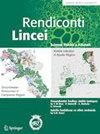IL MONDO DEI CHIP: PROGRESSI TECNOLOGICI E VULNERABILITà DI UNA FILIERA STRATEGICA
IF 2.7
4区 综合性期刊
Q2 MULTIDISCIPLINARY SCIENCES
引用次数: 0
Abstract
After a brief coverage of the developments that led to the birth of microelectronics, the note describes the economic and physical laws that have guided the growth of this technological segment for over fifty years. Following the laws of Moore and Dennard, the complexity of microelectronic chips has increased dramatically, reaching the point of incorporating miniaturized components, now nanometric in size, comparable in number to the stars in a galaxy. However, during these decades microelectronics has not only pursued the path of miniaturization. Alongside digital technologies, diversified platforms have developed that allow for the creation of equally essential chips in non-digital product segments. The actors of all these production chains are distributed over the various continents and are strongly interconnected. While much of the advanced digital chip manufacturing is in Asia, most of their design resides in the United States while European companies are at the forefront of sensor, industrial and automotive chips. However, the recent pandemic crisis and rising geopolitical tensions have highlighted how the lack of just one chip can disrupt the production of essential goods. Therefore, the governments of advanced economies are implementing initiatives to logistically relocate manufacturing sites and to strengthen local technological capabilities with the aim of protecting the economies from international crises. Europe too is moving in this direction but, in order to be effective, it is increasingly urgent to solve some weaknesses in the European political construction which also in this field limit the role of our continent on the global scene.芯片世界:技术进步和战略供应链的脆弱性
在简要介绍了导致微电子诞生的发展之后,该说明描述了五十多年来指导这一技术领域发展的经济和物理定律。遵循摩尔和登纳德定律,微电子芯片的复杂性急剧增加,达到了集成小型化组件的地步,现在的尺寸是纳米级的,数量与星系中的恒星相当。然而,在这几十年里,微电子不仅追求小型化的道路。除了数字技术之外,多元化的平台已经发展起来,可以在非数字产品领域创造同样重要的芯片。所有这些生产链的参与者分布在各大洲,并且紧密相连。虽然许多先进的数字芯片制造都在亚洲,但它们的大部分设计都在美国,而欧洲公司则处于传感器、工业和汽车芯片的最前沿。然而,最近的大流行危机和不断加剧的地缘政治紧张局势突显出,缺乏一种芯片可能会扰乱必需品的生产。因此,发达经济体的政府正在采取措施,在物流上重新安置生产基地,并加强当地的技术能力,以保护经济免受国际危机的影响。欧洲也在朝着这个方向前进,但是,为了发挥效力,日益迫切需要解决欧洲政治建设中的一些弱点,这些弱点也在这方面限制了我们大陆在全球舞台上的作用。
本文章由计算机程序翻译,如有差异,请以英文原文为准。
求助全文
约1分钟内获得全文
求助全文
来源期刊

Rendiconti Lincei-Scienze Fisiche E Naturali
MULTIDISCIPLINARY SCIENCES-
CiteScore
4.10
自引率
10.00%
发文量
70
审稿时长
>12 weeks
期刊介绍:
Rendiconti is the interdisciplinary scientific journal of the Accademia dei Lincei, the Italian National Academy, situated in Rome, which publishes original articles in the fi elds of geosciences, envi ronmental sciences, and biological and biomedi cal sciences. Particular interest is accorded to papers dealing with modern trends in the natural sciences, with interdisciplinary relationships and with the roots and historical development of these disciplines.
 求助内容:
求助内容: 应助结果提醒方式:
应助结果提醒方式:


